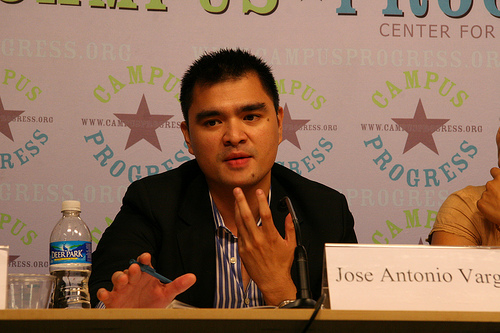The Vargas Situation: Doing the Right Thing?

To answer one of the questions, NPR has reported that “based on recent policy derivatives, signs point to ‘no,’” regarding his deportation. The recent policy is that unless the person is posing a major threat, they should be considered a lesser priority—which makes Jose Vargas virtually stable in this country for now.
Immigrations and Customs Enforcement has no desire to make an example out of him, and frankly Vargas’ point is that as a productive, well-to-do member of society, he shouldn’t have to deal with being sent back to his native country of the Philippines for 10 years before he can apply to become a citizen. He put a face to the 11 million Americans living illegally, especially for those who would be protected under the DREAM Act. The DREAM Act, which failed to make it to the Senate in December, gives a path for illegal immigrants 36 and younger who came to the US as children, have lived here for five years or more, and are attending college or serving in the military.
At AU, journalism students are required to take an ethics class, where we learn very harsh lessons—if a baby and a person were both dying on a bridge, for example, you should save neither of them, because you should be reporting on the story and it would hurt your journalistic integrity.
In the real world, with real life ethical dilemmas, it becomes more complicated. For those who decided to help Jose Vargas, a small circle of about 10 or so people, they made a moral choice. Phil Bronstein, in an article in the San Francisco Chronicle where Vargas was once employed, described his frustrations in “I was duped by Jose Vargas, illegal immigrant.” Bronstein described feeling a little silly for recommending him for jobs, but not felonious for unknowingly harboring a criminal at the Chronicle.
The real dilemma here is that people who are the seekers of truth either assisted or unknowingly were mislead about Jose Vargas’ identity. Editors, especially at The Washington Post, are frustrated, citing that lies and journalism do not mix, and Vargas broke their trust. I wonder if this is because journalists value themselves more as detectives, seeking the ultimate truth. They allowed Vargas in the High Profile Organizations Journalists Club, and were shocked to find they hadn’t vetted him enough.
Jack Shafer compared the situation to another high profile reporter, Janet Cooke, who misrepresented herself on her resume as a Phi Beta Kappa from Vassar, when she was neither. Of course the inherent difference here is that Vargas forged federal documents while Cooke typed something false on her resume. Shafer argues what my professors would argue—that a lie, whether big or small is a lie and a conflict of interest with the profession of a journalist.
What most people are arguing, however, is that without these lies, Vargas would have been fated to a life working in kitchens and picking fruit, wasting his talent to chase the American Dream. However, as we learn, the law isn’t moral. The law is ethical, just as journalism is.
At almost every stage of Vargas’s life, he had at least one companion who knew the truth: an American citizen who helped or at least tolerated his illegal ascension through American society. Now that Vargas has gone public as an illegal alien, the federal government is facing the same moral and ethical dilemma as his friends. ICE had the opportunity to make an example out of Vargas, but even they are hesitant to enact the law. If even the unbiased, hard-lined federal government doesn’t know where to draw the line, who does?
Photo by Campus Progress via Flickr






